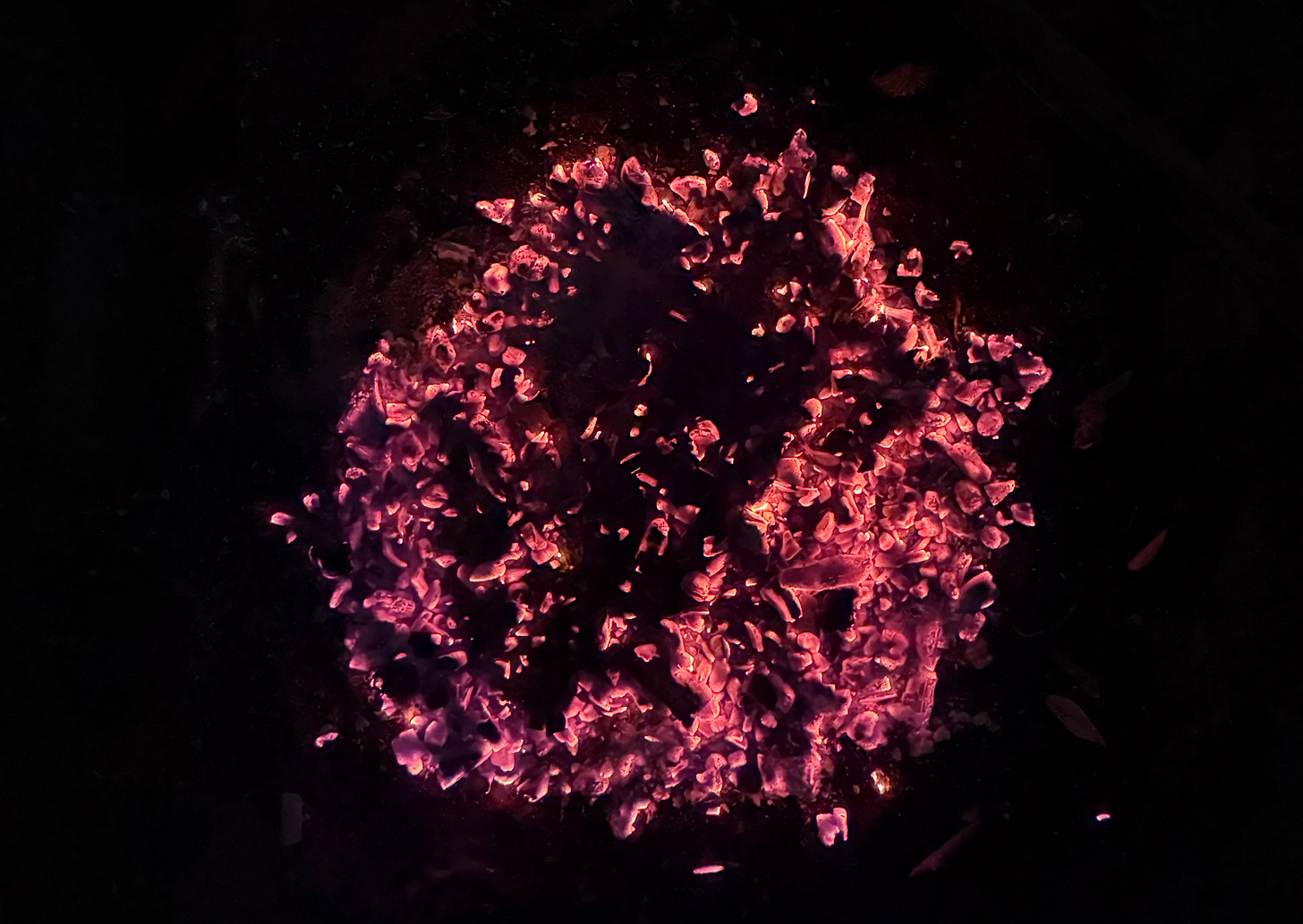Tending Fire and 'Truth Resistance'
On Being Present when it's Uncomfortable
Last night, I sat by a river tending fire.
The moon was bright in the starry sky, and crickets played background music.
I watched the fire burn, coals a deep red under the lighter flame. Sparks climbed upward into the sky. I watched…
And, I felt myself itching to do something.
I picked up a stick to move the logs around, and then caught myself and said, “No, this would be rushing.” It had occurred to me that the fire didn’t need me to move logs around, and that I felt like adjusting the fire only for my own benefit, but not because it would benefit the fire.
It was important realization for me. When I live life, sometimes this is how I interact with people I’m relationship with or with work that I’m doing; I adjust the fire even when it doesn’t need it.
This comes from two lacks:
A lack of trust that everything is and always will work our just as it’s meant to, and
A lack of capacity in me to simply let myself enjoy whatever is happening; to be.
These two lacks have driven much of my action in life. They’ve made me into a do-er instead of a be-er.
I think that both lacks are fairly common in our world. At least, I notice both often in the worlds of my clients.
As I sat by the fire, I felt over and over again this urge to move, to change, to adjust. Anyone who has ever meditated will understand this. It’s an unconscious discomfort that’s looking to be eased.
Almost a little internal voice that says: ‘This isn’t good enough. Change something.’
But, what if nothing has to change?
And, rationally, it clicked. While I was tending fire last night, in my brain, I got it.
“Ah, this is perfectly well right now, always. I’m okay. Nothing is wrong. I can just be here.”
But this is where this idea of Truth Resistance comes in. As I was talking to ChatGPT tonight, it gave me this phrase to describe when our brain rationally knows something but our body is caught in an old trauma response or subconscious belief system. There’s an acknowledgement of the real thing, but it can’t land, almost like it slips off one’s deeper awareness.
I had a client describe to me recently that she had been complimented by her loved ones, but was unable to actually let herself receive those compliments. I imagine each compliment streaming toward her, like bullets toward Neo in The Matrix, only for her to unintentionally dodge them all. This is Truth Resistance. It’s the subconsciously driven inability to let what is true land in our nervous systems.
Trauma-informed approaches to somatics talk about how our body perceives change from familiarity as unsafe, even if it’s “better” or “safer” for us in reality. When we’ve experienced something difficult in our younger years, we will often create deeply unconscious patterns of behavior to protect ourselves from perceived threats. The key here is that the threats are usually only perceived, not real.
So, to come back to the fire. What do we do when we’re in Truth Resistance mode? Perhaps the answer is the same as with the fire: Usually, nothing. Perhaps there’s nothing to do… Or rather, perhaps, we could actively choose to not do anything.
There’s a subtle different. Doing nothing is often perceived as lazy or not worthwhile. Whereas “choosing to not do” is actually incredibly powerful, especially when one’s nervous system is yelling: “This isn’t safe or comfortable! Do something to change it! Anything! Please!”
And, breathe. Even when our nervous systems are yelling at us that we’re not safe. We can breathe. We can enter into that natural moving stillness, where breath fills us and leaves us and our consciousness witnesses this. We can find safety in the normalcy of our own existence. We can ground ourselves even when we feel “Groundless.”
In “When Things Fall Apart,” by Pema Chodron, she writes of this idea of Groundlessness. It’s the experience of our stability falling out from underneath us. She says that feelings like loneliness or fear are forms of Groundlessness, and even boredom. It’s a fundamental rejection of our current state. Some part of us is saying: “This isn’t okay. Something needs to change.”
But, maybe, like with the fire, it’s all okay. Maybe we can trust ourselves to keep living the same way the fire will keep burning. Maybe we’re okay. Maybe nothing needs to change. Maybe all that is needed is less doing, more being, more presence, more noticing, more curiosity, more allowing what is.
I’ll leave you with a short poem, this fine evening.
With trellises of blooms there is naught to do but admire. As the cool breeze flows on a hot day, need anything be done? Peace is not in the doing. Peace is in the being. Do the crickets sing from a place of lack? Does the moon shine to unburden itself of desire? No, the world turns simply because it turns. The truth is in the way we receive to all.
Blessings dear readers,
Faolan
PS. If you like what I write, let me know! I love hearing your reactions <3
PPS. Another thought I had just now (immediately pre publishing) is that the time that fires need the most care and attention are at the beginning and the end, and especially the end. To tend a fire down so that all the wood burns equally demands patience, attention, and intention. Interesting metaphor :)
PPPS. Pre-publishing thought number 2: What makes good wood in life? If what’s important when tending fire is to place high quality wood in the right place at the right time, what are all those things, and how can we tell? Would love your thoughts!


